Public Holidays Thailand
Below are listed Public Holidays for the January 2009-December 2010 period.
2009
1 Jan New Year's Day.
9 Feb* Magha Bucha Day.
6 Apr Chakri Day.
13-15 Apr Songkran (Thai New Year).
1 May Labour Day.
5 May Coronation Day.
9 May* Visakha Bucha.
1 Jul Mid Year Bank Holiday.
8 Jul* Khao Phansa Day (Buddhist Lent).
12 Aug HM The Queen's Birthday.
23 Oct Chulalongkorn Day.
5 Dec HM The King's Birthday.
10 Dec Constitution Day.
31 Dec New Year's Eve.
2010
1 Jan New Year's Day.
Feb* Magha Bucha Day.
6 Apr Chakri Day.
13-15 Apr Songkran (Thai New Year).
28 Apr Visakha Bucha.
1 May Labour Day.
5 May Coronation Day.
1 Jul Mid Year Bank Holiday.
Jul* Khao Phansa Day (Buddhist Lent).
12 Aug HM The Queen's Birthday.
23 Oct Chulalongkorn Day.
5 Dec HM The King's Birthday.
10 Dec Constitution Day.
31 Dec New Year's Eve.
Note
* The religious festivals are determined by the Buddhist lunar calendar and therefore are difficult to predict. The dates provided here are estimates.
Passport/Visa
Thailand
Passport Required?
British Yes
Australian Yes
Canadian Yes
USA Yes
Other EU Yes
Visa Required?
British No
Australian No
Canadian No
USA No
Other EU 1/2
Return Ticket Required?
British Yes
Australian Yes
Canadian Yes
USA Yes
Other EU Yes
Passports
Passport valid for six months on date of application required by all nationals referred to in the chart above.
Visas
Not required by all nationals referred to in the chart above for touristic stays of up to 30 days (if entering via an international airport) or 15 days (if entering by land from a neighbouring country), provided they hold valid passports, sufficient funds (20,000 baht per person or 40,000 baht per family) and confirmed airline tickets to leave Thailand within the time allowed by their visa, except:
1. nationals of Bulgaria, Romania and Malta who do need to obtain a visa before travelling to Thailand;
2. nationals of Cyprus, Czech Republic, Estonia, Hungary, Latvia, Liechtenstein, Lithuania, Poland, Slovak Republic and Slovenia who may apply for visas on arrival for stays of up to 15 days. A fee is payable for this visa.
Visa Note
(a) The total duration of stay in Thailand for persons who enter Thailand without a visa cannot exceed 90 days during any six month period, counting from the date of first entry.
(b) If you intend on staying or working in Thailand for longer than 30 days you must obtain a Tourist visa for stays of up to 60 days or a Non-immigrant visa for stays of up to 90 days.
(c) Nationals not refer
red to in the chart above are advised to contact the embassy to check visa requirements (see Contact Addresses).
Types of Visa and Cost
Tourist: £28 (per entry). Non-immigrant: £45 (single-entry); £100 (double-entry).
Validity
Tourist: three months, 6 months for more than one entry; Non-immigrant single-entry: three months; Non-immigrant multiple-entry: one year.
Applications to:
Consulate (or consular section at embassy or high commission); see Contact Addresses.
Working Days Required
Two. Postal applications are usually being processed within 24 hours. Applications made in person take 30 minutes.
Population:
Thais are well-known for their friendliness and hospitality. A large majority of over 62 million citizens of Thailand are ethic Thai, along with strong communities whose ethnic origins lie in China, India and elsewhere. About 7 million people reside in the capital city of Bangkok.
People:
Thai (80%), Chinese (10%), Malay (3%), and the rest are minorities (Mons, Khmers, hill tribes) Ethnic Thais form the majority, though the area has historically been a migratory crossroads, and has thus produced a degree of ethnic diversity. Integration is such, however, that culturally and socially there is enormous unity.
Language:
Spoken and written Thai is largely incomprehensible to the casual visitor. However, English is widely understood, particularly in Bangkok where it is almost the major commercial language. English and some European Languages are spoken in most hotels, shops and restaurants in major tourist destinations, and Thai-English road and street signs are found nationwide.
Religion:
Buddhism (95%), Muslim (4%), others (1%)
Thailand is one of the most strongly Buddhist countries in the world. The national religion is Theravada Buddhism, a branch of Hinayana Buddhism, practiced by more than 90 % of all Thais.
The remainder of the population adheres to lslam, Christianity, Hinduism and other faiths all of which are allowed full freedom of expression. Buddhism continues to cast strong influence on daily life. Senior monks are highly revered. Thus, in towns and villages, the temple (wat) is the heart of social and religious life. Meditation, one of the most popular aspects of Buddhism, is practiced regularly by numerous Thai as a means of promoting inner peace and happiness.
Administration:
76 provinces, each subdivided into amphoe (district), tambon (sub-district) and muban (village)
Geography
The kingdom of Thailand lies in the heart of Southeast Asia, making it a natural gateway to Indochina, Myanmar and Southern China. Its shape and geography divide into four natural regions : the mountains and forests of the North; the vast rice fields of the Central Plains; the semi-arid farm lands of the Northeast plateau; and the tropical islands and long coastline of the peninsula South.
The country comprises 76 provinces that are further divided into districts, sub-districts and villages. Bangkok is the capital city and centre of political, commercial, industrial and cultural activities. It is also the seat of Thailand's revered Royal Family, with His Majesty the King recognised as Head of State, Head of the Armed Forces, Upholder of the Buddhist religion and Upholder of all religions.
Thailand is a constitutional monarchy with His Majesty King Bhumibol Adulyadej, or King Rama IX, the ninth king of the Chakri Dynasty, the present king. The King has reigned for more than half a century, making him the longest reigning Thai monarch. Thailand embraces a rich diversity of cultures and traditions. With its proud history, tropical climate and renowned hospitality, the Kingdom is a never-ending source of fascination and pleasure for international visitors.
Topography:
Thailand is divided into 4 natural regions:
The mountainous North, with its profusion of multi-coloured orchids, fascinating native handicrafts and winter temperatures are sufficiently cool to permit cultivation of temperate fruits such as strawberries and peaches;
The high Northeast Plateau, which still jealously guards its many archaeological and anthropological mysteries;
The Central Plain, one of the world's most fertile rice and fruit-growing areas with colourful traditional culture and way of life as well as the sandy beaches of the East Coast and vibrant cosmopolitan Bangkok;
The peninsular South where the unspoiled beaches and idyllic islands complement economically vital tin mining, rubber cultivation and fishing.
Government:
Thailand has had a constitutional monarchy since 1932. Parliament is composed of 2 houses, The House of Representatives and the Senate. Both representatives and senators are elected by the people. A prime minister elected from among the representatives leads the government. The country is divided into 76 provinces. The Bangkok Metropolitan Administration comes under an elected governor. Appointed provincial governors administer the other 75 provinces (Changwat), which are divided into districts (Amphoe), sub-districts (Tambon) and villages (Mu Ban).
Head of State:
H.M. King Bhumibol Adulyadej (Rama IX of the Chakri Dynasty)
Head of Government:
Prime Minister Samak Sundaravej
|
|
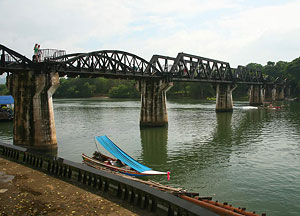
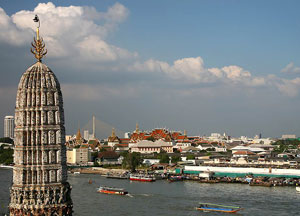

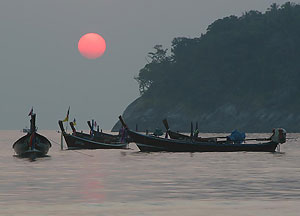
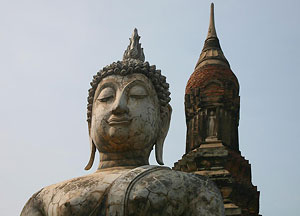
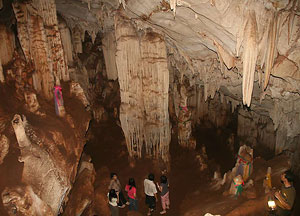
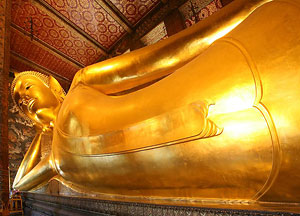

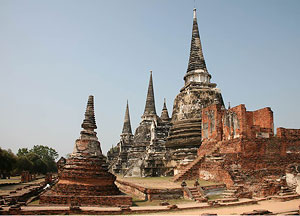
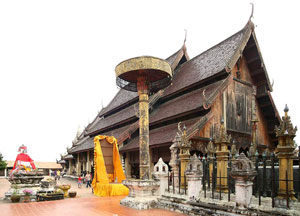


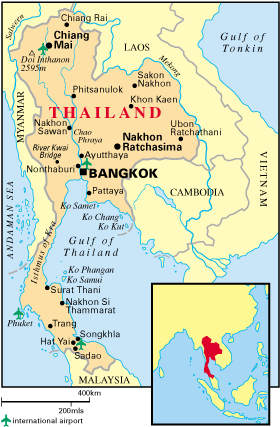
|


